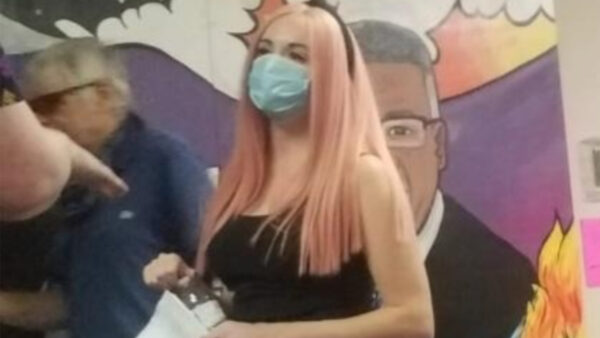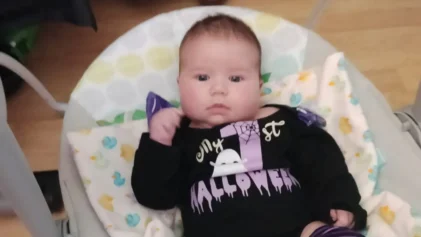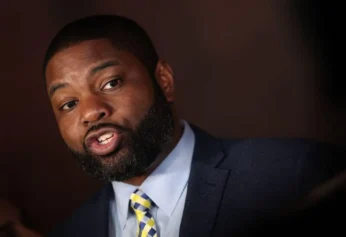The FBI used an undercover cop with pink hair masquerading as a prostitute to infiltrate progressive activist groups in Colorado Springs, Colorado, an extensive report by The Intercept shows.
April Rogers is a detective with the Colorado Springs Police Department. In the summer of 2020, the FBI enlisted her services to infiltrate racial justice groups in order to spy on them. She used the name Chelsie Kurti and said she was a sex worker.

Jon Christiansen is one of the co-founders of the Chinook Center, a progressive community space in Colorado Springs that Rogers walked into claiming that she wanted to volunteer. Christiansen said that Rogers implied that she was a sex worker.
“She implied over the course of getting to know her that she was a sex worker,” said Christiansen. “She dressed in a way that was sort of noticeable,” added his wife, Samantha Christiansen. Rogers claimed to have a file cabinet that she could donate to the center.
“And I was like, ‘Yeah, sure. We need all kinds of stuff,’” said Jon Christiansen. “This giant filing cabinet. In retrospect, after the fact, we’re like, ‘Right, that looks like a filing cabinet that would be in a police station.’”
The outlet claims that Rogers was tapped to act as “Chelsie” during the FBI’s investigation in Denver the same year where a paid FBI informant named Mickey Windecker became a prominent activist in the racial justice organizing scene there. Windecker encouraged activists to become violent and gave the FBI information about an activist who frequented protests in Denver and Colorado Springs.
The information provided prompted the Colorado Springs operation, and Rogers tried to entrap at least two young men into gun-running using tactics employed by Windecker. Windecker allegedly tried to get two activists to commit violent crimes, including assassinating Colorado Attorney General Phil Weiser.
Rogers reportedly began inviting activists back to her apartment with the implication of a possible “sexual encounter.” One of the men, who wishes to remain anonymous, was lured to her apartment and noted that two men were waiting there when he arrived.
“And there’s two guys sitting there with her,” he said, adding that Rogers asked him to find her an illegal gun. “I’m not going to sell one to you illegally,” he replied before leaving the apartment.
Rogers spent a full year infiltrating the community and also tried to entrap activist Gabriel Palcic. Palcic also revealed that when he went to the undercover detective’s apartment, two men were there and said their names were Mike and Omar.
“Mike was missing his left leg from the knee down,” said Palcic. “Omar was kind of a Middle Eastern-looking guy with a big beard. Both had tattoos. Both were very buff.”
Palcic said the two men said that they were truckers who sold illegal weapons. The men told Palcic that they could get guns including AK-47s. They also offered to get him grenades and explosives and asked him if he wanted to buy anything. A curious Palcic met the two men several more times because they were generous and often bought drinks, cigars and dinner. Before long, he was presented with an AK-47 by the men.
“I never saw any grenades or TNT or any of that other s—t they were talking about,” Palcic said. “There were a few times where they were obviously pumping drinks into me,” he added. “‘Yeah, do you want another double shot of that 16-year scotch?’”
Palcic said that he eventually told Mike and Omar that he wasn’t interested in any weapons, noting that he stopped returning their phone calls and text messages.
Democratic Sen. Ron Wyden of Oregon told the outlet that the FBI abused its authority by trying to entrap the activists.
“It’s disturbing, but not surprising, to learn the FBI’s reported targeting of racial justice activists in 2020 wasn’t limited to Denver,” said Wyden. “It is a clear abuse of authority for the FBI to use undercover agents, informants, and local law enforcement to spy on and entrap people engaged in peaceful First Amendment-protected activities without any evidence of criminal activity or violent intent.”
The FBI declined the outlet’s request for an interview, and Rogers also declined to answer any questions when she was called as a witness for a court hearing for activist Charles Johnson. Johnson was arrested during a housing rights march and charged with theft, aggravated assault, and resisting arrest. Rogers claimed that the Department of Justice had instructed her not to answer any questions regarding her activities as an informant.
“I’ve been told to respond, ‘I respectfully decline to answer,’” she said.
Rogers was asked if she believed Johnson was a terrorist by his lawyer, Alison Blackwell.
“Did you think my client was a terrorist threat at any point?”
“I respectfully decline to answer.”
“You can just say no,” noted Blackwell.
“I’ve been told to respond, ‘I respectfully decline to answer,’” Rogers repeated.
Jon Christiansen said he was shocked by the number of resources the FBI used to spy on them with the sting operation.
“I’m blown away by the amount of resources the city had to have spent to spy on peaceful political groups,” he said to Colorado Springs Indy. “This certainly doesn’t seem like a wise use of taxpayer money — to have an undercover cop spending hours to discover that the Tenant Union helps tenants, that the Democratic Socialists of America and Our Revolution try to pass laws and elect candidates that reflect their values, or that the Chinook Center is a space for groups to organize.”


